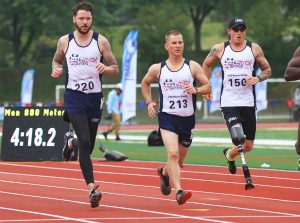Athletics helps Navy vet, AU students come back from ‘dark place’
Chronicle Media Staff — July 11, 2017A return to athletics has helped Aurora University business major Ryan Shannon come back from a

Ryan Shannon (left), a senior majoring in business administration at Aurora University, represented the U.S. Navy in the Department of Defense Warrior Games which concluded last Saturday in Chicago.
“dark place” following injuries suffered while on activity duty with the U.S. Navy.
A native of Morris who now lives in Coal City with his wife and two sons, Shannon competed in several running and swimming events and also captained the U.S. Navy’s sitting volleyball team.at last week’s Warrior Games in Chicago.
Sponsored by the Department of Defense, the Warrior Games began in 2010 as a way to enhance the recovery and rehabilitation of wounded, ill, or injured veterans and active-service members of the armed forces.
Teams representing the Air Force, Army, Marine Corps, Navy/Coast Guard and Special Operations Command — about 270 athletes in all — competed in this year’s games, which include Paralympic-style archery, cycling, shooting, sitting volleyball, swimming, and track and field contests.
Shannon, 29, is defending champion in two events. In the 2016 games, held at the U.S. Military Academy in West Point, New York, he took home gold medals in the 400 meters and 800 meters and silver medals in the mile and 4×100 swimming relay.
In September, he will go on to compete with the combined armed forces’ Team USA at the Invictus Games in Toronto. Founded by Britain’s Prince Harry — himself a two-tour veteran of Afghanistan — the Invictus Games will feature teams from 17 allied nations.
Formerly a petty officer first class aboard the submarine USS Pasadena, Shannon was medically retired in 2016 after being injured while on duty. He suffered traumatic brain injury, post-traumatic stress (PTSD) and partial paralysis of his left foot.
The consequences of his injuries were devastating both physically and emotionally.
“I was on a downward slope,” he said. “My career was over and the doctors were saying that I would never run again.”
Deeply depressed, he even considered suicide — but he didn’t give up. With therapy and determination, he decided not to let his circumstances rule him.
“I taught myself to run,” he said. “I started slow, walking every day, and then I started jogging. Eventually, I hit the track.”
Encouraged to join the Navy’s Safe Harbor Adaptive Sports and Recreation Program, he’s been running ever since – not to mention swimming and playing volleyball.
“The adaptive sports program helped bring me out of a dark place,” he said. “It gave me something to train for, a goal to work toward.”
Always a fierce competitor, Shannon first attended AU in 2005 after being recruited by track coach James Kluckhohn. He became a standout in the 800 meters — and as a peer advisor — before leaving to join the Navy in 2007.
He returned to the university in May of 2016, enrolling in the adult degree completion program in the School of Business and Public Policy. He will finish up his bachelor’s degree in business administration in December 2017 and plans to participate in commencement next May.
“My sister, Brittany [Shannon], will be graduating with a master’s degree in social work,” he said. “It will be pretty cool to walk with her.”
“AU is kind of a center for me,” he said. “I ran track here, I met my wife here. It’s very exciting to me to come back. So much has changed during the past 10 years, it’s like a different place.”
As if school and training for international athletic competition weren’t enough, Shannon has also started a nonprofit foundation called MusicRX, whose mission is to provide musical instruments, instruction and experiences as therapy for veterans, active-service men and women, and first responders, such as firefighters and emergency medical technicians (EMTs), who are recovering from mental and physical trauma suffered on the job.
Shannon, whose musical tastes run “all over the place,” said that listening to his favorite bands enabled him to wean himself off the drugs he was prescribed to fight the effects of PTSD.
“If I feel a PTSD trigger or anxiety attack coming on, I can throw on my headphones and just concentrate on the music for five or 10 minutes,” he said. “It will remove me from the situation without having the zombie-like side effects that can come with medication. Music, whether you play it yourself or listen to it, is medication.”
According to Shannon, the business know-how he is gaining from his AU degree program will help him run MusicRX more efficiently. But the degree, like his success as an athlete, symbolizes much more.
“My motivation is my wife, Jasmine, and my two boys, Kamden and Kaeden,” he said. “They get to watch their dad compete when I could just as easily be sitting on the couch wasting away. But I if I can show them now that I can overcome these things, later in life they’ll believe that they can overcome obstacles too.”
“My disabilities don’t have to define me,” he said. “I can still define myself.”







